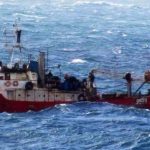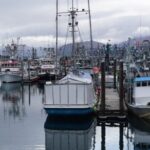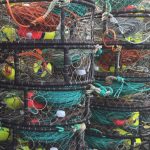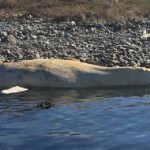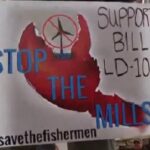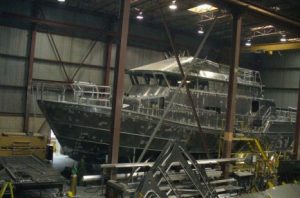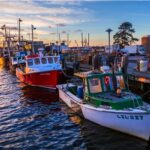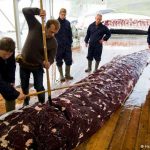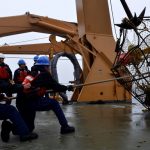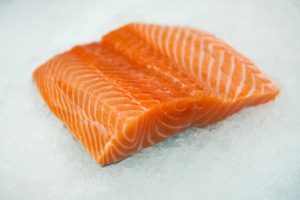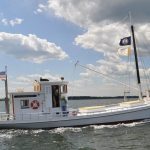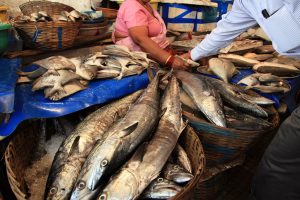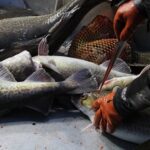Monthly Archives: September 2016
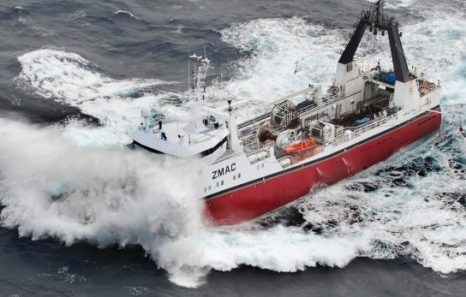
El Nino brings rugged and strange conditions for deep sea fishers
The El Nino weather pattern has made for a strange season of deep sea fishing and some rugged weather conditions for crews to deal with. Talley’s director Andrew Talley said the hoki season had been a good one with plenty of decent sized fish caught. The squid catch had also been good, but the albacore and skipjack tuna seasons had been poor, he said. The changes El Nino brought about in ocean currents, water temperature and feed all affected marine productivity, Talley said. “Ultimately we see that in how these various commercial fisheries perform year to year. The El Nino weather pattern also resulted in stronger than normal winds. The Talley’s owned Amaltal Columbia battled 6 metre swells and 35-45 knot winds when fishing for hoki 150km south of Bluff early this month. A photo of the fishing boat [above] at that time shows the severity of the weather conditions experienced by the 45 crew members working on board the 64 metre long vessel. Read the rest here 08:15
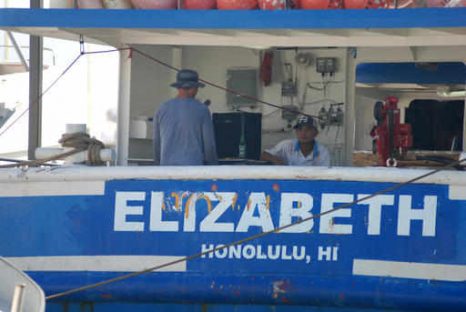
Hawaii lawmakers promise reform for confined fishermen
State and federal lawmakers are promising to improve conditions for hundreds of foreign fishermen working in Hawaii’s commercial fleet, and at least one company has already stopped buying fish from the boats following an Associated Press investigation that found the men have been confined to vessels for years without basic labor protections. While many men appreciate the jobs, which pay better than they could get back home, the report revealed instances of human trafficking, tuberculosis and food shortages. It also found some fishermen being forced to defecate in buckets, suffering running sores from bed bugs and being paid as little as 70 cents an hour. On Capitol Hill, Hawaii’s congressional delegation – U.S. Sens. Mazie Hirono and Brian Schatz along with Rep. Tulsi Gabbard, all Democrats – said they were exploring legislative solutions after being startled by the findings about the state’s $110 million industry, which ranks fifth among the country’s highest-grossing fisheries. Read the story here 06:54
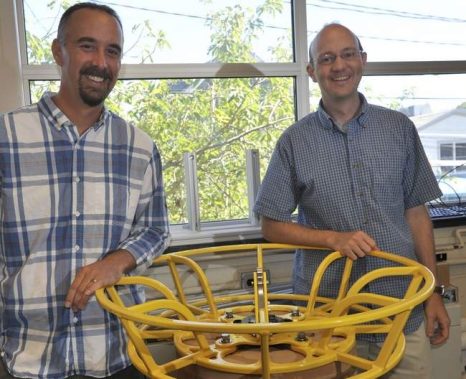
WHOI scientists/engineers secure funds to help commercialize their ropeless lobster pot to the public
Jim Partan and Keenan Ball had an idea for a way to deploy deep-water lobster traps that could help prevent whale entanglements and potentially reopen closed fishing areas off the New England coast. The Woods Hole Oceanographic Institution engineers even had a prototype in hand: a 340-pound, 42-inch-high spindle that would attach to lobster traps and keep fishing line underwater until the gear was ready to be retrieved. What they didn’t have was any funding to bring the spindle out of their their cramped Smith Laboratory workspace to do field testing, a vital step before they could put it on a fishing boat for a trial run. A few years ago, that might have been where their story ended. But thanks to a new initiative within the world-renowned oceanographic research nonprofit, the duo have not only some funding but some logistical support to help their vision for a so-called ropeless lobster trap get to sea. Read the story here, with two more images 11:53
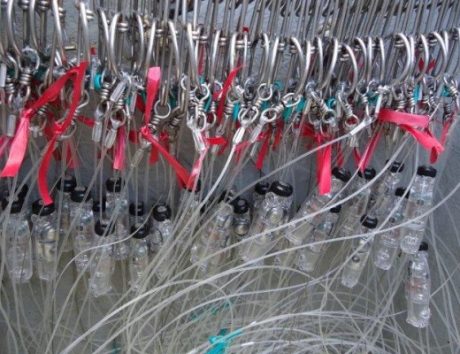
Seabirds off the hook
One of the worst by-products of commercial fishing is the killing of countless seabirds, including albatrosses, every year. British engineers have now come up with a device that could save up to 100 000 albatrosses, as well as petrels, shearwaters and other seabirds, every year. The device is designed to stop birds being caught on long-line fishing lines. It’s called a Hookpod, which is a weighted polycarbonate ‘pod’ that encases the hook until a pressure-sensitive sensor within it detects that the hook is under water. It then slides off the barbed hook. Read the rest here 10:41
John Sackton: Are the big NGOs winning the marine monument battle, but losing the war?
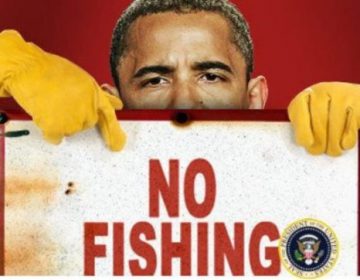 Coinciding with the opening of the Our Oceans conference in Washington, D.C., last week, President Obama announced a new 5,000-square-mile marine monument on the southeast corner of Georges Bank, encompassing three submarine canyons and some seamounts further off the continental shelf. The map of the monument closely hews to the proposed map put out by Connecticut Sen. Richard Blumenthal in a letter to Obama in July. It follows a letter at the end of June from the six senators representing Massachusetts, Rhode Island, and Connecticut, along with a host of environmental non-governmental organizations, or NGOs. Read the op-ed here 10:04
Coinciding with the opening of the Our Oceans conference in Washington, D.C., last week, President Obama announced a new 5,000-square-mile marine monument on the southeast corner of Georges Bank, encompassing three submarine canyons and some seamounts further off the continental shelf. The map of the monument closely hews to the proposed map put out by Connecticut Sen. Richard Blumenthal in a letter to Obama in July. It follows a letter at the end of June from the six senators representing Massachusetts, Rhode Island, and Connecticut, along with a host of environmental non-governmental organizations, or NGOs. Read the op-ed here 10:04
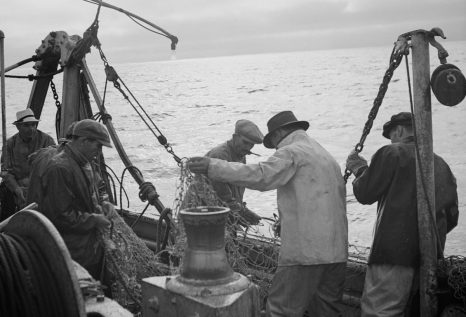
Gloucester fishermen – Trawling the treacherous seas of the North Atlantic 1900-1943
Incorporated in 1642, the Massachusetts town of Gloucester has been one of the centers of the North Atlantic fishing industry for centuries. And it’s seen more than its fair share of heartbreak. The town grew rapidly in the 1800s, as it provided a convenient launching point for trips to the fertile offshore fishing grounds of George’s Bank and the Grand Banks. Gloucester fishermen sailed in specially designed schooners optimized for speed and holding capacity to reach the banks, fill up on cod and other fish and return as quickly as possible. Many of these ship designs were unsafe and prone to capsizing in bad weather, however: Between 1866 and 1890, some 2,450 men and 380 schooners were lost at sea. Aid organizations eventually established funds and boarding houses to support the widows and families of lost fishermen. In the 20th century, Gloucester fishermen switched from schooners to motorized trawlers. Yet the profession remained hazardous. The vessels featured in these photos, the Old Glory and the Alden, both lost men in the 1940s. An excellent selection of photo’s can be viewed by clicking here 08:51
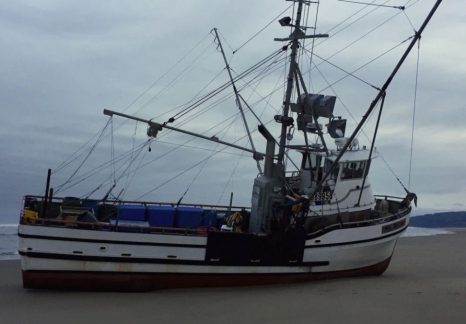
Coast Guard monitoring grounded fishing vessel in Florence, Ore.
Coast Guard personnel are monitoring the 50-foot commercial fishing vessel /Ms Nicani after it went aground on a beach north of the Siuslaw River Bar north jetty, Saturday. A shore party from Coast Guard Station Siuslaw River responded, took pictures and noted no obvious pollution concerns, and the master of the vessel is contacting local tug operators for salvage. Watchstanders at Coast Guard Sector North Bend received the initial report at 2:17 a.m. from the two-person crew with reportedly no injuries. 19:44
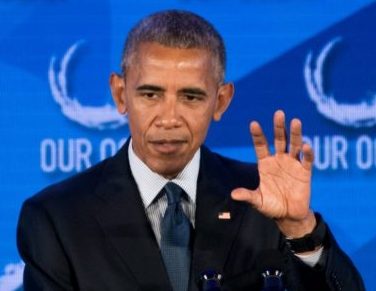
Some New England Fishermen Consider A Fight Over Obama’s Monument. This Is Why They Should.
When the concept of the National Marine Monument arose, it was a surprise to many people, and the notion of it becoming reality seemed far fetched. This week we learned it was reality, and it was a stinging slap in the face. Rep Rob Bishop R-Utah tipped us of with an article titled, “Obama will leave his legacy at the expense of fishermen”, Sept, 14th, on the eve of the State Departments “Our Oceans” conference in Washington, DC. The confirmation the following day was bitter for many. There have been hundreds of articles written in the aftermath from the enviro friendly, to the revelations of the many fishermen that will be affected, including some that say the industry will consider a legal challenge, and challenge that designation they should! Meghan Lapp the Fisheries Liaison for Seafreeze Ltd. and is active in the process of fishery management, wrote an article that appeared in the Massachusetts Lobsterman’s Association Newsletter pre announcement of the designation. As with all good fishery articles, it is timeless and important to be seen by as many fishermen and the general public after the fact, because it lays out the basis as to why this should be a call to action to reverse this Obama Antiquities Act overreach that, quite possibly, may not be legal at all. Click here to read the article with a number of links at the bottom of the page. 17:58
Commentary: Leave fishery management to the pros (not Sam Farr) by Larry Collins
 I’m a professional seafood harvester. I offer a service by catching fish and making it accessible to you so you can concentrate on other productive endeavors. As part of my job, I comply with a dense set of rules to ensure the sustainability of the service I provide, and of the seafood at your dinner table.,, It’s the role of the state and federal governments to make sure I achieve those goals. And together we do a great job of making sure your fisheries are sustainable. Overfishing is virtually non-existent on the West Coast, and the types of gear we’re allowed to use are already tightly regulated to protect habitat features. So it’s confounding that non-fishermen who would claim to promote the sustainability of your oceans are actually working to shut your fisheries down. U.S. Rep. Sam Farr, D-Central Coast, recently introduced HR 5797, a bill that would permanently end several forms of fishing at seven ocean ridges and seamounts off the California coast. The justification for the closures is protection of creatures and habitat features on the seafloor. Read the article here 14:39
I’m a professional seafood harvester. I offer a service by catching fish and making it accessible to you so you can concentrate on other productive endeavors. As part of my job, I comply with a dense set of rules to ensure the sustainability of the service I provide, and of the seafood at your dinner table.,, It’s the role of the state and federal governments to make sure I achieve those goals. And together we do a great job of making sure your fisheries are sustainable. Overfishing is virtually non-existent on the West Coast, and the types of gear we’re allowed to use are already tightly regulated to protect habitat features. So it’s confounding that non-fishermen who would claim to promote the sustainability of your oceans are actually working to shut your fisheries down. U.S. Rep. Sam Farr, D-Central Coast, recently introduced HR 5797, a bill that would permanently end several forms of fishing at seven ocean ridges and seamounts off the California coast. The justification for the closures is protection of creatures and habitat features on the seafloor. Read the article here 14:39
Atlantic Marine Monument Was Created To “Appease Environmental Terrorists”
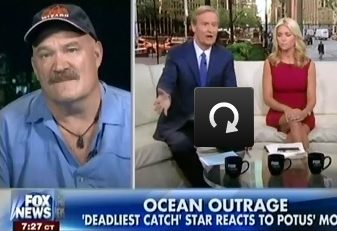 Media Matters decided to take a segment from Fox news where they interviewed Captain Keith Colburn in discussing the President Obama creating the first marine monument in the Atlantic Ocean. Gazing at other headlines at the post, it’s easy to understand Media Matters is another liberal leaning website that like to mock anyone that disagrees. Its not a bad interview, and I appreciate a well known fisherman speaking on the subject, bringing attention to the truth. Environmental Terrorism of the elitist ENGO is alive and well, thriving to close off more fishermen from their chosen occupation because its never enough. Video, read the rest here read the comments. The ignorance is astounding. 11:58
Media Matters decided to take a segment from Fox news where they interviewed Captain Keith Colburn in discussing the President Obama creating the first marine monument in the Atlantic Ocean. Gazing at other headlines at the post, it’s easy to understand Media Matters is another liberal leaning website that like to mock anyone that disagrees. Its not a bad interview, and I appreciate a well known fisherman speaking on the subject, bringing attention to the truth. Environmental Terrorism of the elitist ENGO is alive and well, thriving to close off more fishermen from their chosen occupation because its never enough. Video, read the rest here read the comments. The ignorance is astounding. 11:58
US and Canadian Lobster exporters looking to EU customers for help in averting Swedish proposed ban
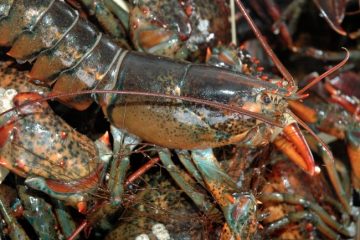 The American and Canadian lobster industries are looking to countries like Spain, Italy and France to help scuttle the Swedish proposal to label lobster ‘invasive.’ “Our best allies are our customers,” said Annie Tselikis, executive director of the Maine Lobster Dealers Association. “Science should win this battle for us, but we’re not taking any chances because Europe is a huge market for live Maine lobster. So we’re working with our embassies abroad to pressure our major buyers of live lobster to speak up. We can’t have this ban and they can’t have it, either. Italian importers, Spanish dealers, French restaurants. They all want Maine lobster, and we want to sell it to them.” Read the story here 10:21
The American and Canadian lobster industries are looking to countries like Spain, Italy and France to help scuttle the Swedish proposal to label lobster ‘invasive.’ “Our best allies are our customers,” said Annie Tselikis, executive director of the Maine Lobster Dealers Association. “Science should win this battle for us, but we’re not taking any chances because Europe is a huge market for live Maine lobster. So we’re working with our embassies abroad to pressure our major buyers of live lobster to speak up. We can’t have this ban and they can’t have it, either. Italian importers, Spanish dealers, French restaurants. They all want Maine lobster, and we want to sell it to them.” Read the story here 10:21
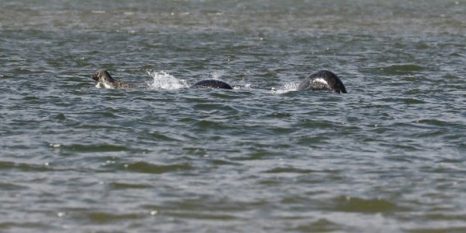
Some People Think This New Photo of the ‘Loch Ness Monster’ is Totally Legit
Over the years a number of people have come forward with photos claiming to show the legendary Loch Ness monster, but most of them are almost always determined to be hoaxes or cases of mistaken identity. But a new image taken by a amateur photographer and whisky warehouse worker from Scotland has some people convinced that this is actually the real thing. Ian Bremner, 58, says he was riding around the Scottish Highlands looking for deer last Saturday when he snapped the above photo of what he believes is the most convincing photo ever taken of the famous Loch Ness monster commonly referred to as Nessie. Of course the internet has gotten behind the idea: Read the story here 09:49
Deep Thinker Kerry: Ocean Protection Is ‘Life and Death’ National Security Issue
 Secretary of State John Kerry spoke Friday morning at an ocean preservation summit at Georgetown University, saying the state of the world’s oceans is a pressing international security issue. “This is life and death. This is national security. This is international security,” Kerry said. He cited black carbon in the Arctic, rapidly increasing acidification in oceans that harms crustaceans, and illegal, unregulated fishing that is “strip mining the oceans and threatens to destroy an entire ecosystem.” The speech comes just two days after State Department Under Secretary Cathy Novelli cautioned in a press briefing that the amount of plastic in the ocean is so high that “if you lined up garbage bags of plastic along the coast, every coastline that touches the ocean in the entire world, you would have five deep of garbage bags.” If current patterns continue, there will be more plastic than fish in the ocean by 2050, she said. Read the dogma here 09:12
Secretary of State John Kerry spoke Friday morning at an ocean preservation summit at Georgetown University, saying the state of the world’s oceans is a pressing international security issue. “This is life and death. This is national security. This is international security,” Kerry said. He cited black carbon in the Arctic, rapidly increasing acidification in oceans that harms crustaceans, and illegal, unregulated fishing that is “strip mining the oceans and threatens to destroy an entire ecosystem.” The speech comes just two days after State Department Under Secretary Cathy Novelli cautioned in a press briefing that the amount of plastic in the ocean is so high that “if you lined up garbage bags of plastic along the coast, every coastline that touches the ocean in the entire world, you would have five deep of garbage bags.” If current patterns continue, there will be more plastic than fish in the ocean by 2050, she said. Read the dogma here 09:12
The heartbreak of lost Shea Heights fishermen, for friends, families and reporters alike – Jonathan Crowe
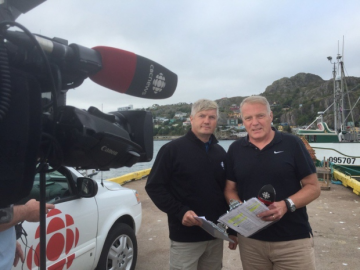 In 31 years at the CBC I’ve seen a lot. I’ve covered murders, sex assault trials and every permutation of accidental death, from fire to car crashes. Most of the nasty stuff we cover has already happened. It’s a murder scene with police tape around it, a car crash with a blue tarpaulin draped over the spot where someone bled out or died on impact. There’s already a distance established when the reporters show up. We are shooting the aftermath, trying to piece together the story from the police. But there is nothing as raw as a loss at sea. A boat going down is heartbreakingly different than such other tragedies, especially when it affects a community —especially when that community is as close-knit as Shea Heights. And worse, when two of the men still have not been recovered, the inevitable is cruelly dragged out. Read the story here 08:19
In 31 years at the CBC I’ve seen a lot. I’ve covered murders, sex assault trials and every permutation of accidental death, from fire to car crashes. Most of the nasty stuff we cover has already happened. It’s a murder scene with police tape around it, a car crash with a blue tarpaulin draped over the spot where someone bled out or died on impact. There’s already a distance established when the reporters show up. We are shooting the aftermath, trying to piece together the story from the police. But there is nothing as raw as a loss at sea. A boat going down is heartbreakingly different than such other tragedies, especially when it affects a community —especially when that community is as close-knit as Shea Heights. And worse, when two of the men still have not been recovered, the inevitable is cruelly dragged out. Read the story here 08:19
World’s oldest fishhook found on Okinawa
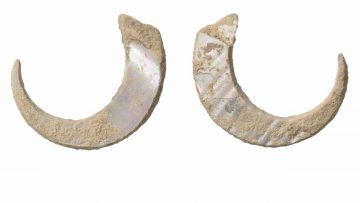 There’s no telling what kinds of fishermen’s tales they told, but the early modern humans who lived on tiny Okinawa Island between mainland Japan and Taiwan nearly 30,000 years ago are the world’s oldest known anglers. Now, archaeologists have discovered the oldest known fishhooks in a limestone cave in the island’s interior, dating back nearly 23,000 years. The fishhooks, all carved from shells, were found in Sakitari Cave, which was occupied seasonally by fishermen taking advantage of the downstream migrations of crabs and freshwater snails. Unlike their mainland counterparts, who fashioned tools and beads out of shells and stones, the ancient people of Okinawa Island used shells almost exclusively. Japanese archaeologists excavating the cave discovered both a finished and an unfinished fishhook that had been carved and ground from sea snail shells. By radiocarbon dating pieces of charcoal found in the same layer as the fishhooks, the researchers determined the hooks were between 22,380 and 22,770 years old. Read the rest here 19:46
There’s no telling what kinds of fishermen’s tales they told, but the early modern humans who lived on tiny Okinawa Island between mainland Japan and Taiwan nearly 30,000 years ago are the world’s oldest known anglers. Now, archaeologists have discovered the oldest known fishhooks in a limestone cave in the island’s interior, dating back nearly 23,000 years. The fishhooks, all carved from shells, were found in Sakitari Cave, which was occupied seasonally by fishermen taking advantage of the downstream migrations of crabs and freshwater snails. Unlike their mainland counterparts, who fashioned tools and beads out of shells and stones, the ancient people of Okinawa Island used shells almost exclusively. Japanese archaeologists excavating the cave discovered both a finished and an unfinished fishhook that had been carved and ground from sea snail shells. By radiocarbon dating pieces of charcoal found in the same layer as the fishhooks, the researchers determined the hooks were between 22,380 and 22,770 years old. Read the rest here 19:46
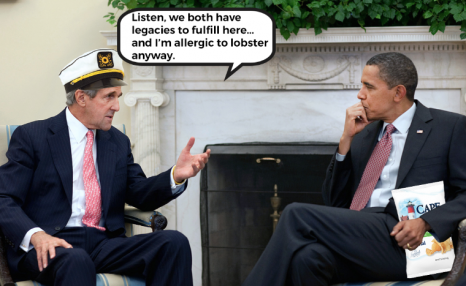
Resources Committee Chairman Rob Bishop (R-Utah) called it!
Bishop called it. President Obama designated the first marine national monument in the Atlantic Ocean this week–off the coast of Cape Cod. Once again, the President made a huge decision without consulting anyone he really needed to, especially fishermen. Click HERE to view Chairman Bishop’s op-ed predicting the administration’s assault on lobster rolls. 16:57
UK Overseas Territories Marine Protection Areas to double in four years
 Speaking ahead of “Our Ocean” conference in Washington DC, Foreign Office Minister Sir Alan Duncan announced plans to double the area of ocean under marine protection around the UK Overseas Territories to around four million square kilometers, greater than the landmass of India. This will involve the permanent closure of an additional one million square kilometers of ocean to commercial fishing, to preserve important marine life. The UK will pledge £20 million over the next four years to support the implementation, management, surveillance and crucially the enforcement of these new Marine Protected Areas (MPAs). Hosted by US Secretary of State John Kerry, the two-day Our Ocean conference will bring together governments, scientists, business leaders and NGOs from around the world to tackle threats to the ocean, including from marine pollution and the climate. Read the story here 16:20
Speaking ahead of “Our Ocean” conference in Washington DC, Foreign Office Minister Sir Alan Duncan announced plans to double the area of ocean under marine protection around the UK Overseas Territories to around four million square kilometers, greater than the landmass of India. This will involve the permanent closure of an additional one million square kilometers of ocean to commercial fishing, to preserve important marine life. The UK will pledge £20 million over the next four years to support the implementation, management, surveillance and crucially the enforcement of these new Marine Protected Areas (MPAs). Hosted by US Secretary of State John Kerry, the two-day Our Ocean conference will bring together governments, scientists, business leaders and NGOs from around the world to tackle threats to the ocean, including from marine pollution and the climate. Read the story here 16:20
New England fishermen consider whether to fight Atlantic monument designation
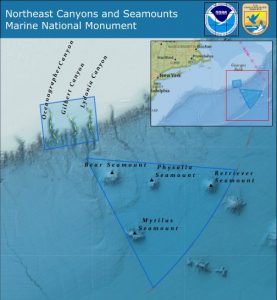 Fishermen in New England say President Barack Obama needlessly dealt a big blow to their industry when he created the Atlantic Ocean’s first marine national monument and circumvented the existing process for protecting fisheries. The new Northeast Canyons and Seamounts Marine National Monument consists of nearly 5,000 square miles of underwater canyons and mountains off the New England coast. The designation will close the area to commercial fishermen, who go there primarily for lobster, red crab, squid, whiting, butterfish, swordfish and tuna. After Thursday’s announcement, fishermen pondered their next move: sue, lobby Congress to change the plan or relocate. It’s hard to move, they said, because other fishermen would likely already be fishing where they would want to go. They said the designation process wasn’t transparent and the administration should have let the New England Fishery Management Council, which is charged with regulating the region’s fisheries, finish working on the coral protection measures it’s considering. Read the story here 14:20
Fishermen in New England say President Barack Obama needlessly dealt a big blow to their industry when he created the Atlantic Ocean’s first marine national monument and circumvented the existing process for protecting fisheries. The new Northeast Canyons and Seamounts Marine National Monument consists of nearly 5,000 square miles of underwater canyons and mountains off the New England coast. The designation will close the area to commercial fishermen, who go there primarily for lobster, red crab, squid, whiting, butterfish, swordfish and tuna. After Thursday’s announcement, fishermen pondered their next move: sue, lobby Congress to change the plan or relocate. It’s hard to move, they said, because other fishermen would likely already be fishing where they would want to go. They said the designation process wasn’t transparent and the administration should have let the New England Fishery Management Council, which is charged with regulating the region’s fisheries, finish working on the coral protection measures it’s considering. Read the story here 14:20
Free lifejackets with satellite tracking devices for Plymouth fishermen?
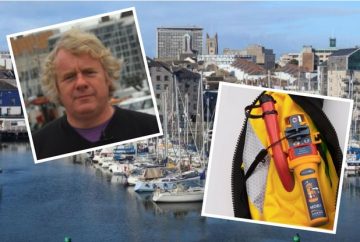 Fishermen could soon be issued with free lifejackets featuring personal satellite tracking devices which could help save lives. Plymouth City Council is considering applying to a European fund for money to buy jackets equipped with locator beacons. Cllr Tudor Evans, Labour Party leader, will table a motion on the subject at Monday’s full council meeting. “These things save lives,” Cllr Evans said. “We spend a lot of money on safe cycling and safe walking, and that’s all very good on land, but there’s money available to improve the possibility of saving fishermen’s lives. “As we are a massive fishing industry here, we thought it would be a good idea and it seems to have gone down well.” “The important thing about this is they improve the prospect of being found in the water,” he said. Read the story here 12:59
Fishermen could soon be issued with free lifejackets featuring personal satellite tracking devices which could help save lives. Plymouth City Council is considering applying to a European fund for money to buy jackets equipped with locator beacons. Cllr Tudor Evans, Labour Party leader, will table a motion on the subject at Monday’s full council meeting. “These things save lives,” Cllr Evans said. “We spend a lot of money on safe cycling and safe walking, and that’s all very good on land, but there’s money available to improve the possibility of saving fishermen’s lives. “As we are a massive fishing industry here, we thought it would be a good idea and it seems to have gone down well.” “The important thing about this is they improve the prospect of being found in the water,” he said. Read the story here 12:59
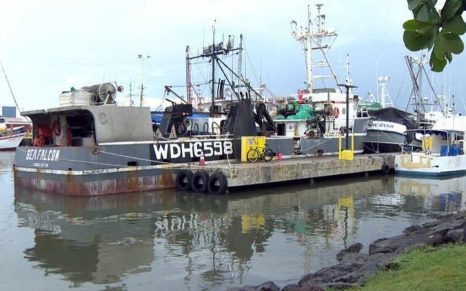
Hawaii’s Longline Fishing industry pushes back following questions about labor practices
Allegations of harsh treatment of workers in Hawaii’s longline fishing fleet have made headlines nationally. Now, the industry is defending itself, one day after a grocery store chain stopped buying tuna from Hawaii’s fish auction. There are 140 longline boats and 700 fishermen in Hawaii’s fishing fleet. The undocumented workers’ employment is legal. “It’s a very in-demand job for them,” Hawaii Longline Association president Sean Martin said. University of Hawaii professor Uli Kozok interprets for Indonesian fishermen. He’s heard complaints of physical abuse aboard the boats. “They’re quite a few stories that I’ve heard where fishermen were beaten by the captain or by the first officer,” he said. He said fishermen complain of insufficient food and third-world working conditions. Martin thinks the allegations are unfounded. “It’s a long ways from slave labor and human trafficking,” he said. Read the story here 11:25
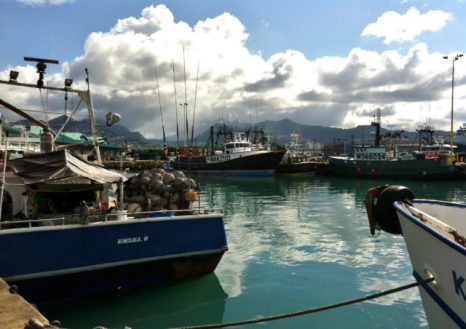
US Labor Dept. to look at conditions affecting foreign workers on American fishing vessels in Hawaii
Labor Department official said the agency is “deeply disturbed” by news reports about the long hours, low wages and inhumane living conditions suffered by up to 700 workers from Southeast Asia and the Pacific islands. The official said the agency was reaching out to other U.S government agencies to try to figure out what to do about it. “The Department of Labor is committed to ensuring that workers are treated with respect, fairness, and dignity,” said Labor Department spokesperson Jason Surbey in an emailed statement. A widely published report by the Associated Press found that some workers are held in prison-like captivity at the piers of Honolulu and San Francisco when the ships are being unloaded. When at sea, the AP reported, they work up to 20 hours a day at wages as low as 70 cents an hour. Read the story here 11:07
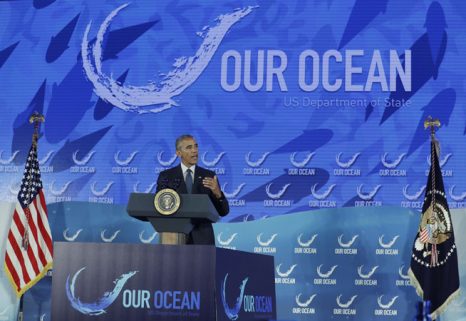
Todays Roundup of East Coast Marine Monument Entries. The list will grow.
It is a very sad day for the New England fishing industry following the Presidents announcement that he pretty much made fishery management irrelevant when he created his enviro gift to every ENGO known to man. There are many articles about it, and we will post the ones with various politicians that represent their fishing constituents, and from members of the industry in the press. 09:49
‘Sad day’ for the fishing industry following marine monument designation – click here Tarr: Marine monument punishes fishermen – click here Quit crabbing: Obama creates major no-go zone for fishermen in the Atlantic – click here Fishermen upset over creation of Atlantic’s first monument – click here Obama: ‘Oceans key to protecting planet from climate change’ click here
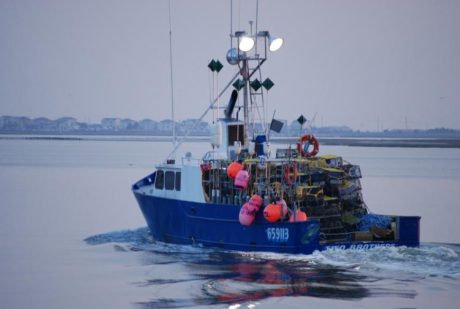
Marine monument designation of Canyons & Seamounts: Gov. Baker says it undermines Mass. fishermen
“The Baker-Polito Administration is deeply disappointed by the federal government’s unilateral decision to undermine the Commonwealth’s commercial and recreational fishermen with this designation,” Baker spokesman Brendan Moss said in an email. “The Commonwealth is committed to working with members of the fishing industry and environmental stakeholders through existing management programs to utilize the best science available in order to continue our advocacy for the responsible protection of our state’s fishing industry while ensuring the preservation of important ecological areas. The Atlantic Offshore Lobstermen’s Association condemned the declaration, accusing the president of abusing his power and “indiscriminately” drawing a border “without taking into account the complexity of the marine ecosystem and domestic fishing fleet.” Read the story here 19:02
Wonder why your progressive friends are loony? Read this! Humans Are Overfishing the Oceans Into ‘Unprecedented’ Mass Extinction
 People are driving marine ecosystems to “unprecedented” mass extinction, according to a new study published Wednesday in the journal Science. Large-bodied animals will be the first to go, the study says—blue whales, great white sharks, and bluefin tuna, for example. Their size is part of their vulnerability, making them more susceptible to fishing and hunting by humans, “the dominant threat to modern marine fauna,” the researchers found. “If this pattern goes unchecked, the future oceans would lack many of the largest species in today’s oceans,” co-author Jonathan Payne, associate professor and chair of geological sciences at Stanford University, told the Guardian. “Many large species play critical roles in ecosystems and so their extinctions could lead to ecological cascades that would influence the structure and function of future ecosystems beyond the simple fact of losing those species.” Read the rest here 16:43
People are driving marine ecosystems to “unprecedented” mass extinction, according to a new study published Wednesday in the journal Science. Large-bodied animals will be the first to go, the study says—blue whales, great white sharks, and bluefin tuna, for example. Their size is part of their vulnerability, making them more susceptible to fishing and hunting by humans, “the dominant threat to modern marine fauna,” the researchers found. “If this pattern goes unchecked, the future oceans would lack many of the largest species in today’s oceans,” co-author Jonathan Payne, associate professor and chair of geological sciences at Stanford University, told the Guardian. “Many large species play critical roles in ecosystems and so their extinctions could lead to ecological cascades that would influence the structure and function of future ecosystems beyond the simple fact of losing those species.” Read the rest here 16:43
Debate: Is Sea Shepherd a Navy? How do we define a navy?
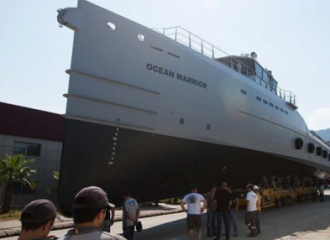 A lively Twitter conversation between Center for International Maritime Security (CIMSEC) members Chris Rawley, Claude Berube, and Ryan Mewett regarding the nature of a Navy, specifically whether or not the Sea Shepherd Conservation Society’s (SSCS) fleet constitutes such a force, inspired the following debate. Rawley and Berube have taken the affirmative position while Mewett has taken the negative position. A rarely asked but fundamental question is: how do we define a navy? The answer might appear to be self-evident. Merriam-Webster defines a navy as: the part of a country’s military forces that fights at sea; a group of ships; a nation’s ships of war and logistic support; and the complete naval establishment of a nation including yards, stations, ships, and personnel. But are these criteria accurate or sufficient in the twentieth century? The authors assert that under a more appropriate definition, the maritime arm of the Sea Shepherd Conservation Society (SSCS) is a navy. How does Sea Shepherd meet those criteria? Read the story here 14:44
A lively Twitter conversation between Center for International Maritime Security (CIMSEC) members Chris Rawley, Claude Berube, and Ryan Mewett regarding the nature of a Navy, specifically whether or not the Sea Shepherd Conservation Society’s (SSCS) fleet constitutes such a force, inspired the following debate. Rawley and Berube have taken the affirmative position while Mewett has taken the negative position. A rarely asked but fundamental question is: how do we define a navy? The answer might appear to be self-evident. Merriam-Webster defines a navy as: the part of a country’s military forces that fights at sea; a group of ships; a nation’s ships of war and logistic support; and the complete naval establishment of a nation including yards, stations, ships, and personnel. But are these criteria accurate or sufficient in the twentieth century? The authors assert that under a more appropriate definition, the maritime arm of the Sea Shepherd Conservation Society (SSCS) is a navy. How does Sea Shepherd meet those criteria? Read the story here 14:44
Maritime lobster boom: Fancy pickups, a boat shortage and a nice situation for the industry right now!
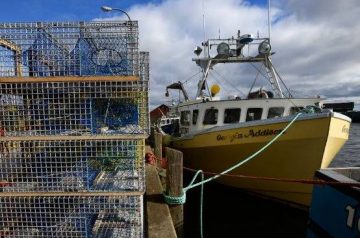 The industry across the Maritimes moved into high gear last year, and has gained momentum since. Amid growing demand for the tasty crustaceans, fishermen have been hauling in record catches that are commanding the highest prices in more than a decade. Aside from $65,000 trucks, the fishermen are also buying new boats — if they can. “The order books are full and many yards are booked for a couple of years out,” says Tim Edwards, executive director of the Nova Scotia Boatbuilders Association. “They’re busier than they’ve been in at least 10 years, maybe 12.” Part of the reason why boatbuilders can’t keep up is a growing demand for longer, wider, more complex boats, typically worth between $500,000 and $750,000. The latest generation of vessels include so-called live wells designed to carry lobster in freshly circulated seawater. The tanks keep the lobsters healthy, which means they’re worth more at the dock. Read the story here 12:48
The industry across the Maritimes moved into high gear last year, and has gained momentum since. Amid growing demand for the tasty crustaceans, fishermen have been hauling in record catches that are commanding the highest prices in more than a decade. Aside from $65,000 trucks, the fishermen are also buying new boats — if they can. “The order books are full and many yards are booked for a couple of years out,” says Tim Edwards, executive director of the Nova Scotia Boatbuilders Association. “They’re busier than they’ve been in at least 10 years, maybe 12.” Part of the reason why boatbuilders can’t keep up is a growing demand for longer, wider, more complex boats, typically worth between $500,000 and $750,000. The latest generation of vessels include so-called live wells designed to carry lobster in freshly circulated seawater. The tanks keep the lobsters healthy, which means they’re worth more at the dock. Read the story here 12:48
NTSB Assesses U.S. Coast Guard’s Vessel Traffic Service System
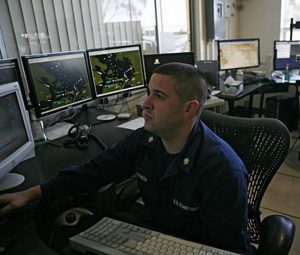 A safety study released Tuesday by the National Transportation Safety Board details 14 conclusions and 21 recommendations aimed at further reducing the risk of collisions, allisions, and groundings involving vessels operating within U.S. Coast Guard Vessel Traffic Service areas. The study, “An Assessment of the Effectiveness of the U.S. Coast Guard Vessel Traffic Service System” (NTSB/SS-16/01), focused on the performance of the Coast Guard’s VTS system, currently comprised of 12 VTS centers. The need for the study was driven by the investigation of six major commercial vessel accidents since the Coast Guard’s 2009 implementation of its “Vessel Traffic Service National Standard Operating Procedures Manual.” Information provided by the Coast Guard indicates collisions, allisions and groundings within VTS areas between 2010 and 2014 resulted in two fatalities, 179 injuries and more than $69 million in damage to vessels, facilities, infrastructure and the environment. Read the story here 11:07
A safety study released Tuesday by the National Transportation Safety Board details 14 conclusions and 21 recommendations aimed at further reducing the risk of collisions, allisions, and groundings involving vessels operating within U.S. Coast Guard Vessel Traffic Service areas. The study, “An Assessment of the Effectiveness of the U.S. Coast Guard Vessel Traffic Service System” (NTSB/SS-16/01), focused on the performance of the Coast Guard’s VTS system, currently comprised of 12 VTS centers. The need for the study was driven by the investigation of six major commercial vessel accidents since the Coast Guard’s 2009 implementation of its “Vessel Traffic Service National Standard Operating Procedures Manual.” Information provided by the Coast Guard indicates collisions, allisions and groundings within VTS areas between 2010 and 2014 resulted in two fatalities, 179 injuries and more than $69 million in damage to vessels, facilities, infrastructure and the environment. Read the story here 11:07
Fishermen, you are not included. The its “Our Ocean Conference” starts today
 The State Department holds the “Our Ocean Conference” today, where the President will announce the closure of cantons and seamounts off of the coast of New England. I went to the Our Oceans website, which you can access by clicking here. You can read the agenda by clicking here. There is also a live stream that you can watch by clicking here. You can read the bio’s of keynote speaker by clicking here. Many will be familiar to you, and after reviewing the material, I can assure you this is their ocean, not yours. 09:58
The State Department holds the “Our Ocean Conference” today, where the President will announce the closure of cantons and seamounts off of the coast of New England. I went to the Our Oceans website, which you can access by clicking here. You can read the agenda by clicking here. There is also a live stream that you can watch by clicking here. You can read the bio’s of keynote speaker by clicking here. Many will be familiar to you, and after reviewing the material, I can assure you this is their ocean, not yours. 09:58







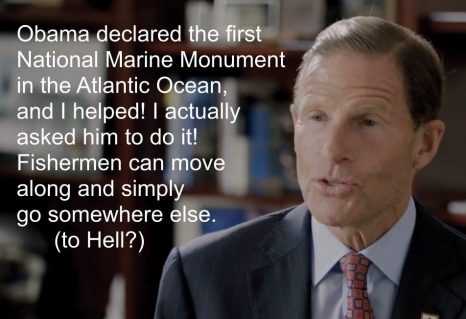 Roll the tape! Click on the image to watch.
Roll the tape! Click on the image to watch.



























